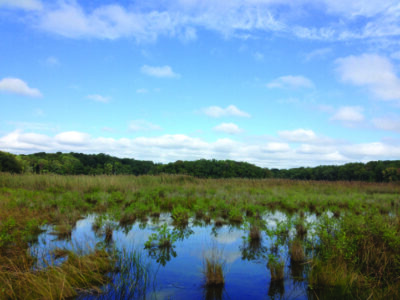
Kirkpatrick Marsh Chesapeake Bay. Flooded region of Kirkpatrick Marsh on the Chesapeake Bay in Maryland. [Courtesy Patrick Megonigal, Smithsonian Environmental Research Center]
Coastal sciences research supported by the Environmental System Science (ESS) program seeks to address key uncertainties in the fundamental and predictive understanding of integrated coastal environmental systems and to improve their representation in Earth system models. The complexity of coastal sciences provides opportunities for the U.S. Department of Energy (DOE) to bring to bear a broad range of interconnected capabilities and tools to advance models, experiments, and observations across a hierarchy of scales, from local to regional to global dimensions of the Earth system. Additionally, new variable-resolution capabilities in DOE’s Energy Exascale Earth System Model (E3SM) and other advances in process models now enable representation of the critical coastal land-water interface to appropriately capture its highly dynamic processes and drivers. Investigation of coastal systems also addresses all five scientific Grand Challenge areas identified in BER’s Earth and Environmental Systems Sciences Division (EESSD) strategic plan.
Priority Research Objectives
ESS coastal science targets interfaces and transitions between terrestrial and aquatic systems along coastlines and shorelines as areas of great complexity, high uncertainty, and with substantial leverage over local-to-global Earth system processes. Through holistic, hypothesis-driven studies, ESS fundamental research seeks to achieve a systems-level understanding of the processes and drivers of coastal systems and their representation in scale-aware, flexible, and process-rich coastal modeling frameworks. Understanding the physical, biological, and ecological dynamics of complex coastal environments will enable evaluation of their response, feedback, and vulnerability to future climate, environmental, and human pressures, as well as the implications for intersecting environmental and societal interests. Examples of coastal science questions of interest include:
- Understanding fundamental ecological and hydro-biogeochemical processes at this critical terrestrial interface
- Appropriately representing multiscale dynamic and transient characteristics of coastal terrestrial-aquatic interfaces
- Vulnerability, impact, response, and thresholds to chronic and pulse disturbances
- Bidirectional hydro-biogeochemical feedbacks across the terrestrial-aquatic continuum and with the Earth and climate system
Why Coastal Sciences Research is Important
Whether at continental margins or the shorelines of large inland waters, coastal zones are highly sensitive and complex environments with dynamic drivers and processes, whose role in both natural and human systems greatly exceeds their geographic extent. Coastal regions are also subject to increasing pressures of environmental and anthropogenic stresses that may shift or compromise coastal ecosystems, their roles in integrated regional to global climate processes, and the energy and infrastructure reliant upon them. Coastal science research supported by ESS addresses DOE’s mission by advancing transformative science responsive to the Nation’s energy and environmental challenges. Researchers collaborate and leverage efforts with other agencies, state and local governments, and key stakeholders to achieve these goals. By improving the representation and predictability of critical coastal zones in process-based models and Earth system models, ESS coastal sciences research will empower greater predictive capacity for understanding and responding to climate and environmental challenges.

